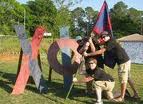And so, if in the middle ages there was no clear distinction between what is public and what private, since the Renaissance they clearly begin to demarcate it. Thus, one-step progressive from private to public, which coincides with the will of the powers political and religious control of the society, and the new educational structures, in particular schools, given they have the support of parents, since they have very clear that taking a child to school is to submit their primary instincts. It is understood that the statement of a young person allows you to master the techniques of the profession that will be devoted to participate in public life. Thus, the success of the new education, responds to an individualism that increases unceasingly. And so for example, lists codes of urbanity which searches for the concealment of the organic. As noted Chartier, the entrance of Western societies in the culture of what is written, is one of the major evolutions of the modern age. With the coming advances in literacy, the circulation of written texts, and dissemination of reading in silence, whose precursor It is said was Petrarch, establishing a lonely relationship between the writer and the book. Books are published in the 16th and 17TH centuries, and thus the Bible is the first book produced in series in Germany at low prices.
The first modern writer who expresses his own privacy in public is Montaigne, who with his essays, and to create a new style of writing, begins a new relationship of the human subject with the literature. We can not forget that the public assistance to religious acts, enable new forms of education. Thus, the sacramental representation, are not only acts of piety, and attendance at theaters that were very popular in England, had an educator power as cinema it has today. Erasmus of Rotterdam and Francois Rabelais, will give a final touch to this era. The first with his praise of folly, return new knowledge, away from the convent, a culture at the service of life, and an irony that makes a mockery of the clergy.
In his work, is not free of his darts ecclesiastical establishment, and as I said author, there becomes befa up in the things of God. Therefore, his work is going to be considered, the battle cry of humanism, and will escape from the inquisitorial arms to the ironic appeal express that it is not he who speaks, but madness. Rabelais in turn, is the ultimate expression of the Renaissance, since his work Gargantua is a critical balance of medieval knowledge, and with his grotesque language he will seek to throw overboard the effort medieval, making use of scatological language, but in the background, through laughter, will show their trust in reason, in the goodness of the man and his creative capacityonly now it will do so away from the heavy language which for two centuries was the resource of educational institutions.

Comments are closed.